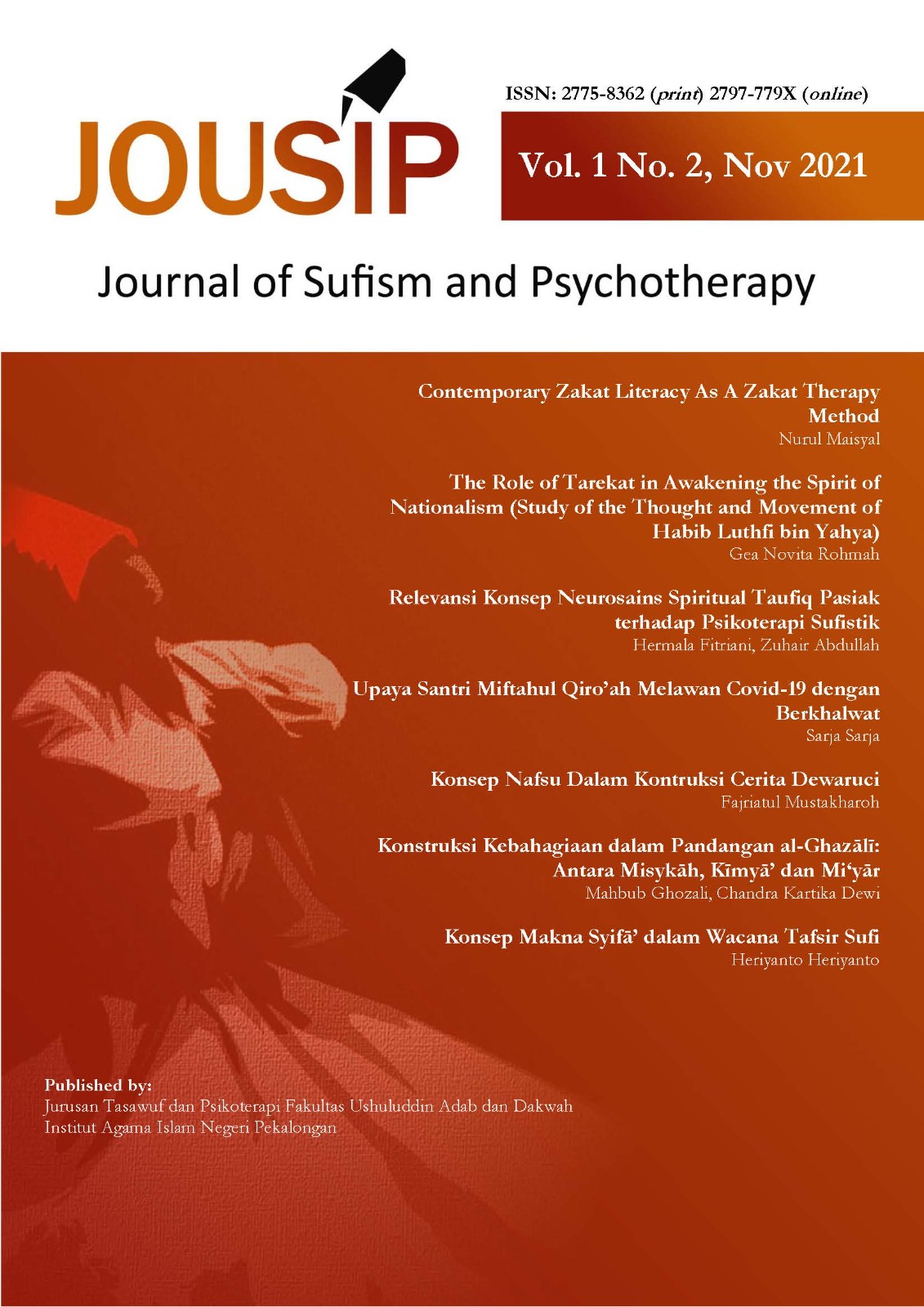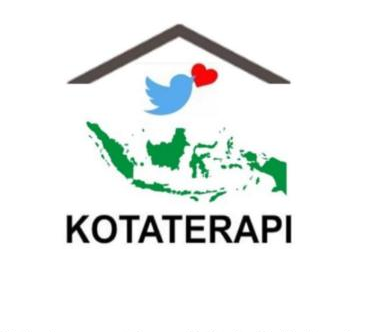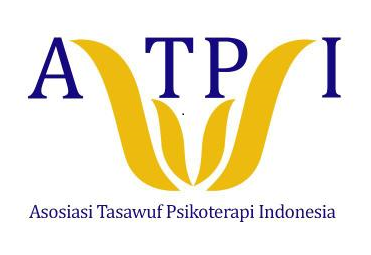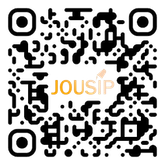Relevansi Konsep Neurosains Spiritual Taufiq Pasiak terhadap Psikoterapi Sufistik
DOI:
https://doi.org/10.28918/jousip.v1i2.4458Keywords:
Neuroscience, Spiritual, Sufistic TherapyAbstract
Taufiq Pasiak is an Indonesian neuroscientist who has succeeded in mapping the spiritual circuits in the brain when a person experiences spiritual experiences. Spiritual activity is a healing medium in the process of Sufistic psychotherapy to cure one's physical and mental illness. On that basis, this study aims to determine the concept of spiritual neuroscience according to Taufiq Pasiak's thoughts, and to find out the relevance of the spiritual neuroscience concept to the healing process in Sufistic psychotherapy. This research is a literature study. Data was collected using the documentation method. The main data sources come from books and works by Taufiq Pasiak, while the supporting data sources come from references that are relevant to the topic of discussion. The data that has been obtained is then analyzed using descriptive methods. The results of this study conclude that the concept of spiritual neuroscience according to Taufiq Pasiak is a study to see human spirituality from the perspective of health and medicine with a brain science approach. Taufik Pasiak succeeded in mapping the four components of the brain that work when a person performs spiritual activities known as neurospiritual operators (ONS). In addition, the results of this study indicate that there is a relevance between spiritual neuroscience and Sufistic psychotherapy in the form of remembrance activities, prayer, fasting, reading shalawat, and praying. When doing sufistic psychotherapy activities, there are brain circuits that work on the prefrontal cortex, association areas, limbic system, and autonomic nervous system which also affect health.
References
Adlina, A. U., & Nadhifah, U. (2019). Sufi Healing dan Neurosains Spiritual bagi Pasien Skizofrenia di Yayasan Jalmah Sehat Desa Bulungkulon, Kudus. Esoterik: Jurnal Akhlak Dan Tasawuf, 05(01). https://doi.org/http://dx.doi.org/10.21043/esoterik.v5i1.5810
Adz-Dzaky, H. B. (2004). Konseling & Psikoterapi Islam. Yogyakarta: Fajar Pustaka Baru.
Al-Zuhayly, W. (1996). Puasa dan Itikaf Kajian Berbagai Madzhab. Bandung: Remaja Rosdakarya.
Arbain, M. (2014). Shalat For Therapy. Yogyakarta: Pustaka Ilmu.
Ariani, N. K. P. (2017). Kebutuhan Spiritual pada Pasien Kanker, Monograf. Denpasar: Universitas Udayana.
Arifin, I. Z. (2008). Bimbingan Penyuluhan Islam. Jakarta: Rajawali Pers.
Dadana, J. C., Pasiak, T. F., & Wangko, S. (2013). Hubungan Kinerja Otak dengan Spiritualitas Manusia Diukur dengan Menggunakan Indonesia Spiritual Health Assessment Pada Pemimpin Agamadi Kota Tomohon. Jurnal E-Biomedik (e-BM), 1(2). https://doi.org/https://ejournal.unsrat.ac.id/index.php/ebiomedik/article/view/5469
Dewi, C. T., Fitri, N. W., & Soviya, O. (2018). Neurosains dalam Pembelajaran Agama Islam. Ta’allum: Jurnal Pendidikan Islam, 6(2), 259–280. https://doi.org/10.21274/taalum.2018.6.2.259-280
Gunawan, E. (2015). Pendidikan Tauhid Perspektif Neurosains dan Implikasinya dalam meningkatkan kecerdasan Spiritual (Telaah Pemikiran Taufiq Pasiak). UIN Sunan Kalijaga.
Julianto, V., & Etsem, M. B. (2011). The Effect of Reciting Holy Qur’an toward Short-term Memory Ability Analysed trought the Changing Brain Wave. (Yogyakarta: Jurnal Psikologi, 38(1). https://doi.org/https://doi.org/10.22146/jpsi.7661
Kamaluddin. (2016). Rahasia Dahsyat Shalawat Keajaiban Lafadz Rasulullah. Yogyakarta: Pustaka Ilmu Semesta.
King, L. A. (2013). Psikologi Umum. Jakarta.: Salemba Humanika.
Maragustam. (2020). Mencetak Pembelajar Menjadi Insan Paripurna; Falsafah Pendidikam Islam. Yogyakarta: Nuhalitera.
Mayasari, R. (2013). Islam dan Psikoterapi. Al-MUNZIR, 6(2).
Najati, M. U. (2005). Psikologi dalam Al-Qur’an: Terapi Qur’ani dalam Penyembuhan Gangguan Kejiwaan. Bandung: CV Pustaka Setia.
Olivia, R. (2016). Shalawat untuk Jiwa. Jakarta: Transmedia Pusaka.
Pasiak, T. F. (2009). Model Penjelasan Spiritualitas Dalam Konteks Neurosains. UIN Sunan Kalijaga.
Pasiak, Taufik. (2020). Otak dan Kota, Kecerdasan Biofilia—Tuhan, Alam, dan Manusia. Bogor: Avi Book.
Pasiak, Taufiq. (2003). Revolusi IQ/EQ/SQ Antara Neurosains dan Al-Qur’an. Bandung: Mizan.
Pasiak, Taufiq. (2007). Brain Management For Self Improvement. Bandung: Mizan.
Pasiak, Taufiq. (2012). Tuhan dalam Otak Manusia. Bandung: Mizan.
Rahmah, M. (2019). Sufi Healing dan Neuro Linguistic Programming. UIN Walisongo.
Rofiqoh, A. (2020). Shalat dan Kesehatan Jasmani. Jurnal Spiritualita, 4(1).
Sholeh, M. (2016). Terapi Shalat Tahajud. Bandung: Noura.
Sikwandi, A., Santoso, T. H., & H, C. T. (n.d.). Pengaruh Terapi Shalawat Nabi terhadap Tingkat Depresi pada Lansia di UPT PSLU Bondowoso. Jember.
Surakhmad, W. (1998). Pengantar Penelitian Ilmiah: Dasar, Metode, dan Teknik. Bandung: Tarsito.
Syarifuddin, A. (2003). Puasa Menuju Sehat Fisik dan Psikis. Jakarta: Gema Insani Press.
Syukur, A. (2012). Sufi Healing. Jakarta: Erlangga.
Tono, S. (1998). Ibadah dan Akhlak dalam Islam. Yogyakarta: UII Press.
Veratamala, A. (2017). Mana yang Lebih Baik untuk Menambah Energi Otak: Lemak Atau Karbohidrat? Retrieved from https://hellosehat.com/nutrisi/sumber-energi-untuk-otak/
Wathon, A. (2016). Neurosains dalam Pendidikan. Jurnal LENTERA: Kajian Keagamaan, Keilmuan, Dan Teknologi, 14(1).
Wilcox, L. (2007). Psychosufi: Terapi Psikologi Sufistik Pemberdayaan Diri. Jakarta: Pustaka Cendekia Muda.
Downloads
Published
Issue
Section
License
Copyright (c) 2021 Hermala Fitriani, Zuhair Abdullah

This work is licensed under a Creative Commons Attribution-ShareAlike 4.0 International License.

















